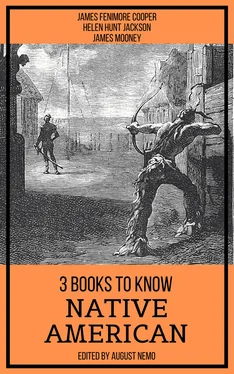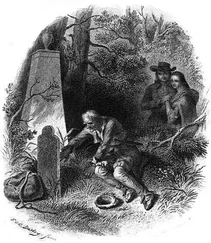14 The meaning of Indian words is much governed by the emphasis and tones.
In the meanwhile, the gravity of Chingachgook remained immovable. He had seated himself more within the circle of light, where the frequent uneasy glances of his guests were better enabled to separate the natural expression of his face from the artificial terrors of the war-paint. They found a strong resemblance between father and son, with the difference that might be expected from age and hardships. The fierceness of his countenance now seemed to slumber, and in its place was to be seen the quiet, vacant composure, which distinguishes an Indian warrior, when his faculties are not required for any of the greater purposes of his existence. It was, however, easy to be seen, by the occasional gleams that shot across his swarthy visage, that it was only necessary to arouse his passions, in order to give full effect to the terrific device which he had adopted to intimidate his enemies. On the other hand, the quick, roving eye of the scout seldom rested. He ate and drank with an appetite that no sense of danger could disturb, but his vigilance seemed never to desert him. Twenty times the gourd or the venison was suspended before his lips, while his head was turned aside, as though he listened to some distant and distrusted sounds — a movement that never failed to recall his guests from regarding the novelties of their situation, to a recollection of the alarming reasons that had driven them to seek it. As these frequent pauses were never followed by any remark, the momentary uneasiness they created quickly passed away, and for a time was forgotten.
“Come, friend,” said Hawkeye, drawing out a keg from beneath a cover of leaves, towards the close of the repast, and addressing the stranger who sat at his elbow, doing great justice to his culinary skill, “try a little spruce; ’twill wash away all thoughts of the colt, and quicken the life in your bosom. I drink to our better friendship, hoping that a little horse-flesh may leave no heartburnings atween us. How do you name yourself?”
“Gamut — David Gamut,” returned the singing-master, preparing to wash down his sorrows in a powerful draught of the woodman’s high-flavored and well-laced compound.
“A very good name, and, I dare say, handed down from honest forefathers. I’m an admirator of names, though the Christian fashions fall far below savage customs in this particular. The biggest coward I ever knew was called Lyon; and his wife, Patience, would scold you out of hearing in less time than a hunted deer would run a rod. With an Indian ’tis a matter of conscience; what he calls himself, he generally is — not that Chingachgook, which signifies Big Sarpent, is really a snake, big or little; but that he understands the windings and turnings of human natur’, and is silent, and strikes his enemies when they least expect him. What may be your calling?”
“I am an unworthy instructor in the art of psalmody.”
“Anan!”
“I teach singing to the youths, of the Connecticut levy.”
“You might be better employed. The young hounds go laughing and singing too much already through the woods, when they ought not to breathe louder than a fox in his cover. Can you use the smooth bore, or handle the rifle?”
“Praised be God, I have never had occasion to meddle with murderous implements!”
“Perhaps you understand the compass, and lay down the water-courses and mountains of the wilderness on paper, in order that they who follow may find places by their given names?”
“I practise no such employment.”
“You have a pair of legs that might make a long path seem short! you journey sometimes, I fancy, with tidings for the general.”
“Never; I follow no other than my own high vocation, which is instruction in sacred music!”
“’Tis a strange calling!” muttered Hawkeye, with an inward laugh, “to go through life, like a catbird, mocking all the ups and downs that may happen to come out of other men’s throats. Well, friend, I suppose it is your gift, and mustn’t be denied any more than if ’twas shooting, or some other better inclination. Let us hear what you can do in that way; ’twill be a friendly manner of saying good-night, for ’tis time that these ladies should be getting strength for a hard and a long push, in the pride of the morning, afore the Maquas are stirring!”
“With joyful pleasure do I consent,” said David, adjusting his iron-rimmed spectacles, and producing his beloved little volume, which he immediately tendered to Alice. “What can be more fitting and consolatory, than to offer up evening praise, after a day of such exceeding jeopardy!”
Alice smiled; but regarding Heyward, she blushed and hesitated.
“Indulge yourself,” he whispered: “ought not the suggestion of the worthy namesake of the Psalmist to have its weight at such a moment?”
Encouraged by his opinion, Alice did what her pious inclinations and her keen relish for gentle sounds, had before so strongly urged. The book was open at a hymn not ill adapted to their situation, and in which the poet, no longer goaded by his desire to excel the inspired king of Israel, had discovered some chastened and respectable powers. Cora betrayed a disposition to support her sister, and the sacred song proceeded, after the indispensable preliminaries of the pitch-pipe and the tune had been duly attended to by the methodical David.
The air was solemn and slow. At times it rose to the fullest compass of the rich voices of the females, who hung over their little book in holy excitement, and again it sank so low, that the rushing of the waters ran through their melody, like a hollow accompaniment. The natural taste and true ear of David governed and modified the sounds to suit the confined cavern, every crevice, and cranny of which was filled with the thrilling notes of their flexible voices. The Indians riveted their eyes on the rocks, and listened with an attention that seemed to turn them into stone. But the scout, who had placed his chin in his hand, with an expression of cold indifference, gradually suffered his rigid features to relax, until, as verse succeeded verse, he felt his iron nature subdued, while his recollection was carried back to boyhood, when his ears had been accustomed to listen to similar sounds of praise, in the settlements of the colony. His roving eyes began to moisten, and before the hymn was ended, scalding tears rolled out of fountains that had long seemed dry, and followed each other down those cheeks, that had oftener felt the storms of heaven than any testimonials of weakness. The singers were dwelling on one of those low, dying chords, which the ear devours with such greedy rapture, as if conscious that it is about to lose them, when a cry, that seemed neither human nor earthly, rose in the outward air, penetrating not only the recesses of the cavern, but to the inmost hearts of all who heard it. It was followed by a stillness apparently as deep as if the waters had been checked in their furious progress, at such a horrid and unusual interruption.
“What is it?” murmured Alice, after a few moments of terrible suspense.
“What is it?” repeated Heyward aloud.
Neither Hawkeye nor the Indians made any reply. They listened, as if expecting the sound would be repeated, with a manner that expressed their own astonishment. At length they spoke together earnestly, in the Delaware language, when Uncas, passing by the inner and most concealed aperture, cautiously left the cavern. When he had gone, the scout first spoke in English.
“What it is, or what it is not, none here can tell; though two of us have ranged the woods for more than thirty years! I did believe there was no cry that Indians or beast could make, that my ears had not heard; but this has proved that I was only a vain and conceited mortal!”
Читать дальше












